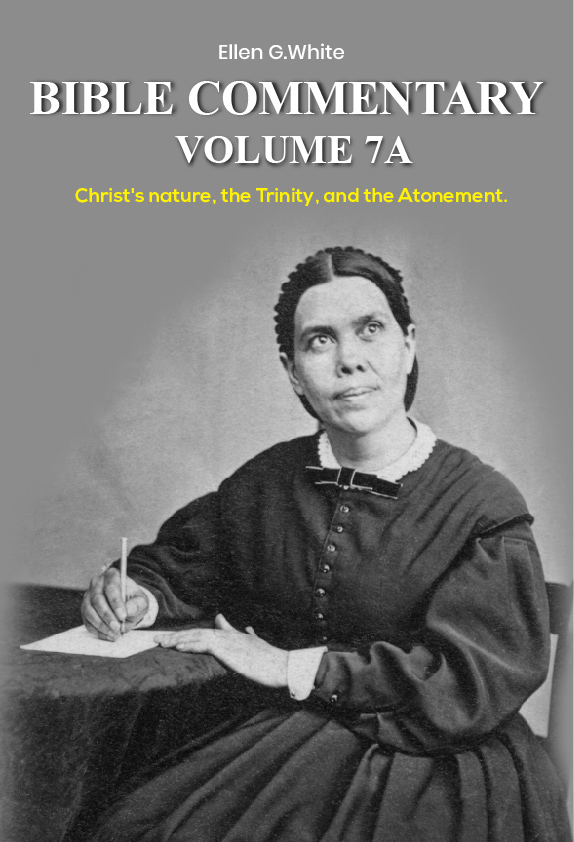Description:
Explore “EGW Comments SDA Bible Commentary Vol. 7A,” a comprehensive compilation of Ellen White’s insights on Christ’s nature, the Trinity, and the Atonement, enriching Biblical study.
Overview of EGW Comments SDA Bible Commentary Vol. 7A
Introduction
“EGW Comments SDA Bible Commentary Vol. 7A” is an indispensable resource for Seventh-day Adventists and Bible scholars seeking a deeper understanding of Scripture through the lens of Ellen G. White’s writings. This volume is a supplementary addition to the seven volumes of the Seventh-day Adventist Bible Commentary series. It compiles Ellen G. White’s profound insights, offering clarity on theological topics such as Christ’s nature, the Trinity, and the Atonement. This book also integrates her commentary on other critical Biblical themes, drawn from her extensive corpus of published and unpublished writings.
Ellen G. White and the SDA Bible Commentary
Ellen G. White (1827–1915) was a co-founder of the Seventh-day Adventist Church and one of its most influential figures. Her writings, regarded by Adventists as inspired, provide spiritual guidance and interpretation of the Scriptures. The SDA Bible Commentary series, initially produced in the mid-20th century, offers comprehensive exegetical notes on the Bible from an Adventist perspective. Vol. 7A uniquely consolidates White’s contributions, emphasizing her role in guiding believers toward a Christ-centered understanding of the Bible.
Structure and Content of the Volume
The volume includes:
- Ellen White Quotations in the SDA Bible Commentary: These are annotations and references to her writings included in the commentary across its seven volumes, which are meticulously gathered into one resource.
- Statements from Questions on Doctrine: This section addresses complex theological issues including:
- Christ’s Nature: Discussions on the human and divine natures of Christ.
- The Trinity: White’s affirmations of the triune nature of God.
- The Atonement: Insights on Christ’s sacrificial death and mediatory work.
The collected materials are organized to allow readers to access White’s interpretations conveniently alongside the corresponding Biblical passages or doctrinal themes.
Key Themes Explored in the Volume
1. Christ’s Nature
One of the most debated topics in Adventist theology is the dual nature of Christ as both fully human and fully divine. Ellen White’s writings delve into:
- The Incarnation: She affirms that Christ took on human nature, yet remained sinless, a cornerstone of salvation theology.
- Victory Over Sin: Emphasizing that Christ’s life is a model for human reliance on divine strength to overcome sin.
These insights clarify Adventist positions, bridging Scriptural exegesis with practical applications for Christian living.
2. The Trinity
The doctrine of the Trinity, though historically controversial in Adventism, is strongly supported by Ellen White’s writings included in this volume. She describes:
- The Relationship Between Father, Son, and Holy Spirit: Demonstrating their unity and distinct roles in the plan of salvation.
- Scriptural Foundations: Drawing from passages that affirm the triune Godhead, she provides evidence for this doctrine as Biblical.
Her statements challenge critics who have misunderstood Adventist theology as anti-Trinitarian, affirming its orthodox stance.
3. The Atonement
The nature and scope of Christ’s atonement are explored extensively. This volume highlights White’s understanding of:
- Christ’s Sacrifice on the Cross: A central act for humanity’s redemption.
- Ongoing Ministry in the Heavenly Sanctuary: The Adventist doctrine of Christ’s priestly role in heaven finds affirmation in her writings, particularly her exposition of Hebrews.
By integrating her views on the atonement, the volume reinforces the Adventist belief in the holistic and ongoing nature of salvation.
4. Biblical Inspiration and Interpretation
Ellen White’s role as a prophetic voice for the Adventist movement places her interpretations as supplementary, not replacing Scripture. Her emphasis is always to point believers to the Bible as the ultimate authority. This volume exemplifies how her writings serve to:
- Illuminate difficult passages.
- Encourage personal Bible study.
- Strengthen faith in God’s promises.
5. Practical Christianity
Beyond doctrinal expositions, White’s writings stress the transformative power of faith. She consistently calls for:
- Holiness of Character: A life reflecting Christ’s example.
- Mission and Service: Spreading the gospel through active ministry.
The volume integrates these practical aspects, urging readers to apply theological truths to everyday life.
Ellen White’s Influence in Adventist Theology
The significance of Vol. 7A lies in its comprehensive approach to controversial and foundational theological questions. By consolidating Ellen White’s insights, it addresses:
- Misconceptions about Adventist beliefs.
- Theological debates within the church, such as prelapsarian vs. postlapsarian views of Christ’s human nature.
Her writings offer clarity and continuity, providing a consistent theological framework that has guided the Adventist Church’s growth and doctrinal stability.
Practical Uses of the Volume
- Theological Study: Ideal for pastors, theologians, and scholars seeking to understand Ellen White’s contributions to Biblical interpretation.
- Personal Devotion: A resource for lay members to deepen their spiritual understanding.
- Apologetics: Defends Adventist beliefs by presenting White’s robust theological statements.
The volume serves as a bridge between Scripture, doctrinal clarity, and personal faith development.
Reception and Legacy
“EGW Comments SDA Bible Commentary Vol. 7A” has been instrumental in reaffirming Ellen White’s role in Adventist theology. It underscores her writings’ continued relevance for contemporary readers. While some may critique the reliance on White’s works, Adventists affirm that her writings provide inspired guidance in harmony with Scripture.
Her emphasis on Christ’s role, the unity of the Godhead, and the ongoing significance of the heavenly sanctuary strengthens the Adventist identity and mission.
Conclusion
“EGW Comments SDA Bible Commentary Vol. 7A” is more than a mere compilation; it is a treasure trove of theological insights, practical applications, and spiritual encouragement. It encapsulates Ellen White’s legacy as a visionary leader and her commitment to leading believers closer to Christ and His Word. By addressing critical issues like Christ’s nature, the Trinity, and the Atonement, it enriches Biblical understanding and solidifies the foundational doctrines of the Seventh-day Adventist Church.
This volume remains a vital tool for anyone seeking to grow in their faith and knowledge of God, bridging Ellen White’s inspired writings with the timeless truths of Scripture.





